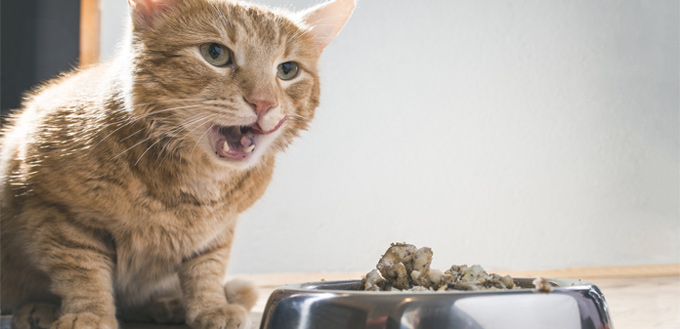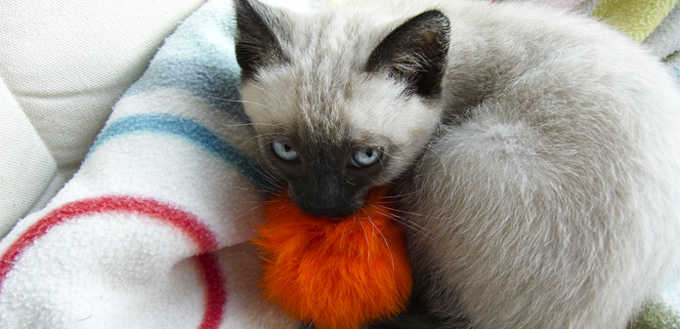Both people and animals sometimes lose their appetite, and it can happen for a variety of reasons, both big and small. Unlike humans, however, our feline companions can’t tell us what’s wrong when they turn away from their food.

It can be frightening to see a beloved pet lose their appetite, and no matter what you think the cause might be, you should take your cat to the vet if they refuse to eat for longer than a day. Below we outline some of the most common reasons that cats stop eating, to give you some insight into your feline friend’s condition.
How to Spot Appetite Loss
As any owner will attest to, cats can be notoriously fussy eaters. Because of this, some cases of appetite loss might simply be caused by a change to their diet. You might have switched cat food brands, changed from a wet to a dry diet (or vice versa), or the manufacturer might have changed their recipe.
However, refusing to eat normally can also be an early indication of an underlying health issue. If your cat seems to have lost their appetite, the following symptoms suggest that it’s probably related to a health issue, rather than their personal food preferences:
- Sudden weight loss
- Other behavioral changes
- Fever
- Shortness of breath
- Pain
- Swollen abdomen
- Weakened heartbeat
- Changes to the appearance of the eyes
- Vomiting or diarrhea
If your cat exhibits one or more of these symptoms alongside their appetite loss, a medical issue is probably at play and you should consult your vet.
Some Major Causes
When a cat loses their appetite, a number of causes can be at play. Below is a selection of the most common:
- Food bowl positioning
Cats can be put off eating if their food bowl is placed in certain areas. If your cat is too frightened to visit the bowl, they may stop eating. For example, if you have other cats who are sometimes aggressive, it’s best to avoid feeding them in the same place. Cats could also be put off their food if it’s next to a frightening object, such as a washing machine or vacuum cleaner. Additionally, cats can be reluctant to eat if their food is placed too close to the cat litter box. This is because, for hygiene reasons, cats never eat close to where they defecate in the wild. Similarly, a cat’s water source would be separate from its food in nature, so cats will usually be more comfortable both eating and drinking if their water bowl is separated from their food bowl.
Related Post: Best Water Bowl for Cats
- Stress
When cats are stressed, their appetite can be affected. Stress can be triggered by a variety of factors, including a significant change to your cat’s lifestyle, your cat feeling afraid, or feeling as if their territory is being encroached upon, which can happen for a number of reasons. Think carefully about what could be causing stress in your cat’s life if you notice any changes to their appetite since stress can actually cause certain animals to eat more than usual.
- Painful eating
If your cat is refusing to eat, this could be because they’re experiencing dental problems. A chipped or broken tooth, abscess, broken jaw, or other oral condition can make your cat feel like eating just isn’t worth it. If possible, it’s worth inspecting your cat’s mouth if they stop eating. Some spinal conditions can also make it difficult for your cat to hold their posture as they eat, so watch out for odd movements and other signs of pain.
- Digestive issues
Problems in a cat’s digestive system can also cause them to lose their appetite. Inflammation or tumors in a cat’s digestive tract can make them feel nauseated and discourage them from eating.

Another digestive issue could be the presence of parasites such as worms. If your cat has eaten something indigestible, perhaps string, this too can cause problems which might result in appetite loss. Finally, vomiting and diarrhea will discourage your cat from taking in more food.
- Infection
Both viral and bacterial infections put the immune system into overdrive, and your cat’s immune response might attempt to ‘purge’ its body of the infection. Part of this process includes vomiting, and avoiding food.
- Recent vaccination
Vaccinations save millions of lives every day, but some animals might develop mild adverse reactions. Among the most common of these side effects is a loss of appetite. The effect is typically mild and temporary, and the stress of a veterinary visit might also be a contributing factor. Nonetheless, be sure to keep a close eye on your cat if they seem reluctant to eat after receiving a vaccination.
- Kidney disease
One serious illness which could cause a loss in appetite is kidney disease. The condition can cause nausea, which discourages your cat from eating. Other symptoms of kidney disease include mouth ulcers, bad breath, constipation, and lethargy. The disease is more prevalent in older cats. Only a vet can diagnose kidney disease, so if your cat has lost their appetite, checking in with them as soon as possible is a good idea.
You May Also Like: Cat Food for Kidney Disease
Encouraging Your Cat to Eat Again
Whatever the cause, there are a few tips you can try to make your cat’s food seem more appealing:
- Warm up the food, as this will make it smell stronger
- Offer strong-smelling foods, such as sardines – the smell stimulates their appetite
- Try hand-feeding your cat
- Try changing the brand of cat food
- Try serving your cat’s food on a plate rather than in a bowl – cats’ whiskers are extremely sensitive, and having them rub against the sides of a bowl can be anything from mildly irritating to highly stressful
- If your cat is on regular medication, avoid putting it in their food. Cats have an incredible sense of smell so will detect the pills and be put off. Instead, wrap pills in a separate treat – ideally a strong smelling one
These tips can also be useful when feeding your cat after medical treatment, or a significant change such as moving home. Like us, cats are sensitive to their surroundings, and might need time and help to adjust to changes. Making food more appealing can help get your pet back into a comfortable routine.
When to Seek Veterinary Attention
Dropping below a healthy weight is dangerous for any animal, but especially so for cats. When a cat stops eating, its body starts to depend on fat reserves for fuel. This fat must be processed by the liver, which requires protein – usually present in the cat’s diet. Without this dietary protein, the liver can become overwhelmed by fat, causing it to fail if left unchecked. Liver failure is a serious issue, which can, sadly, result in death if left untreated.
If your cat has been refusing their food for more than a day, you should contact your vet. The sooner you seek veterinary attention for your pet, the more can usually be done to treat them if they do have a medical condition.
Treatment
How your cat is treated will depend upon what the underlying issue triggering their loss of appetite is. When you visit the vet, they will ask you questions about your cat’s recent medical history, including:
- Whether your cat has been vomiting
- Whether your cat has lost weight
- Whether you have noticed any other symptoms
- Whether your cat has recently undergone a significant change
These indicators will help your vet to work out whether your cat is not eating because they’re not hungry, or because they’re finding it physically difficult. For instance, if your cat has not been vomiting, they might simply have a painful broken tooth which will need to be extracted. The questions will typically be combined with a physical examination by your vet.
If your cat has been vomiting or exhibits other symptoms besides appetite loss, your vet will probably want to use an x-ray to establish whether there are any obstructions or growths along their digestive tract. Your vet might decide to put your cat on an intravenous (IV) drip, to make sure they aren’t dehydrated if vomiting or diarrhea has been an issue. This might be combined with an antiemetic – a drug to prevent further vomiting. If they suspect that the loss of appetite is due to some sort of infection, antibiotics will probably be prescribed. If x-rays reveal that your cat has swallowed something indigestible, your vet may need to carry out surgery to extract the object.
Finally, if your cat is diagnosed with kidney disease, they could be treated with a therapeutic diet, antiemetics, dialysis, or, in extreme cases, a kidney transplant. Treatment will vary from case to case, since kidney disease is usually the result of some other medical issue, such as trauma, infection, kidney stones, or high blood pressure.
Sources:
- Lisa M. Freeman, DVM, PhD, DACVN, Picky Pet Prescription: What To Do When Your Pet Won’t Eat Her Prescribed Therapeutic Diet, The Clinical Nutrition Service
- Dr. Nancy Kay, DVM, DACVIM, Why is My Cat Getting so Thin?, Pet Health Network
- Reduced Or Altered Appetite, Tufts University







